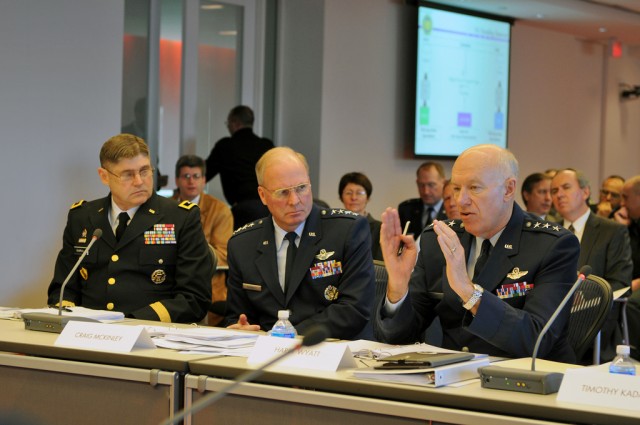
ARLINGTON, Va. (March 19, 2010) -- A new threat environment means a transformed National Guard should maintain its force following drawdowns in Iraq and Afghanistan, the Guard's highest-ranking general said here Wednesday.
"The National Guard must remain a full-spectrum force, available to our governors to assist when disaster strikes and available to the president to execute his duties as commander-in-chief," Air Force Gen. Craig McKinley, the chief of the National Guard Bureau, told the congressionally mandated Advisory Panel on Department of Defense Capabilities for Support of Civil Authorities After Certain Incidents.
The Air National Guard has been at war almost 20 years - since Desert Storm and the no-fly zone enforcement that followed until the Iraq War - while the Army National Guard has fought almost a decade, since the attacks of 9/11. The National Guard has transformed from a strategic reserve to an operational force.
"We have proven we can operate side-by-side with our active component brothers and sisters on the battlefield," McKinley said, "and, in doing so, have built a National Guard that is better-trained, better-equipped and better-led than at any other time."
Throughout its 373-year history, the National Guard has typically been put back on the shelf following major conflicts. Training fades, skills atrophy, equipment ages, and readiness recedes.
Not this time, McKinley urged.
"The current threat environment does not allow us to accept this risk," he said. "Our enemies can strike us here at home. We are unlikely to get advance warning."
Unlike the Cold War paradigm, we cannot afford time to dust off the Guard, re-equip and spend months in pre-mobilization training, he said.
"We must be prepared, like the Minutemen of our heritage, to immediately make the transition from citizen to Soldier or Airman," McKinley told the panel. "We must maintain the readiness we have built."
The advisory panel is assessing how the Defense Department can support civil authorities for chemical, biological, radiological, nuclear and explosives incidents in the homeland. It is chaired by retired Adm. Steve Abbot, a former presidential assistant for homeland security and deputy commander of U.S. European Command.
Frank Keating, former governor of Oklahoma who has served as associate U.S. attorney general and assistant treasury secretary, is the vice-chair. Also among the panel's 13 members are five current or former Guard senior leaders.
To some people, the statutorily established panel, a new Council of Governors and enhancements to the National Guard "seem to reflect a sense to Congress that [the Defense Department] has not adequately planned for or provided resources to respond to catastrophic incidents," McKinley said.
Not true, he said.
"I want to challenge the assumption that [the Defense Department] is either complacent or takes this mission lightly," he said.
As a four-star general, McKinley is included in meetings with the Joint Chiefs of Staff and other top-level discussions, and meets regularly with the chairman of the Joint Chiefs and the secretary of defense.
"I can attest that the department's senior leaders take no issue more seriously than the safety of our citizens here at home," he said.
The panelists are navigating a labyrinth that requires lessons in constitutional law; the relationships between local, state and federal authorities; the different statuses National Guard members serve under with their unique dual-hatted state and federal missions; and the interplay between institutions, such as U.S. Northern Command, the National Guard Bureau, the Defense Department, state emergency managers, governors and other institutions and individuals.
Today's armed forces operate jointly, embracing a Total Force concept of seamless integration between active duty, National Guard and Reserve troops. Any Defense Department response would be in support of civilian authorities and elected officials.
Joining McKinley for Wednesday's testimony were Air Force Lt. Gen. Harry M. Wyatt III, director of the Air National Guard; Army Maj. Gen. Mike Sumrall, the director of the National Guard Bureau's Joint Staff; and Army Brig. Gen. Tim Kadavy, representing the director of the Army National Guard.
The panel is statutorily required to report its findings to the secretary of defense and the House and Senate Armed Services Committees.
(Army Staff Sgt. Jim Greenhill writes for the National Guard Bureau.)

Social Sharing